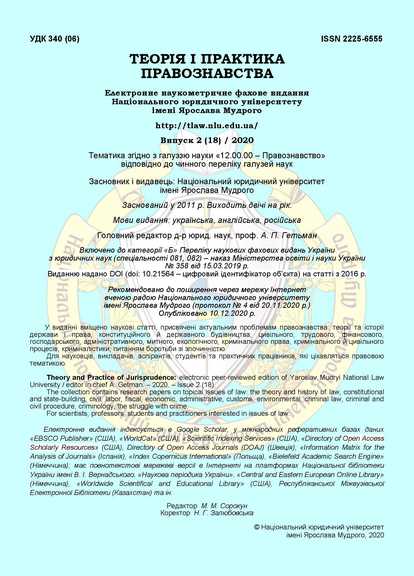Click-wrap license agreement as a type of wrap license agreement
DOI:
https://doi.org/10.21564/2225-6555.2020.18.215650Keywords:
wrap license agreements, click-wrap license agreements, license agreements with a simplified conclusion procedure, electronic license agreements, electronic contracts, click-wrap licensesAbstract
The article is devoted to the study of click-wrap license agreements as a type of wrap license agreements and to the elucidation of the offer and acceptance features in such agreements. The author analyzes the evolution of wrap license agreements in the context of the click-wrap license agreements formation. Careful attention is given to the research of foreign judicial practice concerning a range of issues related to the validity of click-wrap license agreements, the procedure for their conclusion. At the same time, the provisions of national legislation on the outlined topics, as well as a number of scientific works of domestic and foreign legal scholars were studied. It was found that click-wrap license agreements are a special contractual structure with a simplified conclusion procedure, which means that click-wrap license agreements are adhesion contracts, so their terms are set in standard forms and the agreement can be concluded only by joining to its conditions as a whole. Taking into account that click-wrap license agreements are electronic contracts, certain features of the offer to enter into an agreement and the acceptance of such an offer or its rejection are highlighted. It is concluded that pressing a certain button, clicking on a special field, etc. is considered to be an acceptance of the offer to enter into an agreement if the content of these actions is clearly described in the proposal. Based on the findings, the author has developed recommendations for optimizing the functioning of click-wrap license agreements as a regulator of relations of the intellectual property rights disposal. Moreover, the research creates a framework for further study of wrap license agreements in generalReferences
Gatt, A. (2002). Electronic commerce – click-wrap agreements: The enforceability of click-wrap agreements. Computer Law & Security Report, Vol. 18, 6. 404–410. URL: https://edisciplinas.usp.br/pluginfile.php/2056275/mod_resource/content/1/enforceability%20of%20clickwrap%20%28Adam%20Gatt%29.pdf.
Lemley, M.A. (1995). Shrinkwraps in cyberspace. Jurimetrics Journal, Vol. 35, 311–324. URL: https://heinonline.org/HOL/LandingPage?handle=hein.journals/juraba35&div=31&id=&page.
Raysman, R., Pisacreta, E.A., Adler, K.A., Ostrow, S.H. (2006). Intellectual property licensing: forms and analysis. 8th ed. New York: Law Journal Press. URL: https://books.google.com.ua/books?id=OCGsutgMdPIC&pg=SA2-PA35&lpg=SA2-PA35&dq=use+of+wrap+license&source=bl&ots=JUTo2bgEOq&sig=ACfU3U1KOTnvtl3_wz5KT4x93Wq45WLTJA&hl=ru&sa=X&ved=2ahUKEwiSyfrE4_fpAhUCkMMKHarICBcQ6AEwFHoECAkQAQ#v=onepage&q=use%20of%20wrap%20license&f=false.
Case of Step-Saver Data Systems v Wyse Technology (939 F.2d 91): Judgement of US Court of Appeals for the Third Circuit. July 29, 1991. (1991). URL: https://law.justia.com/cases/federal/appellate-courts/F2/939/91/31795/.
Case of ArizonaRetail Sys. Inc. v Software Link Inc. (831 F. Supp. 759): Judgement of US District Court for the District of Arizona. July 27, 1993. (1993). URL: https://law.justia.com/cases/federal/district-courts/FSupp/831/759/1802265/.
Case of ProCD, Inc. v. Zeidenberg (86 F.3d 1447): Judgement of USCourt of Appeals for the Seventh Circuit. June 20, 1996. (1996). URL: https://law.justia.com/cases/federal/appellate-courts/F3/86/1447/538242/.
Case of Hotmail Corporation v. Van$ Money Pie (C 98-20064, 1998 WL 388389): Judgement of US District Court for the Northern District of California. April 16, 1998. (1998). URL: https://cyber.harvard.edu/property00/alternatives/hotmail.html.
Case of Groff v. AmericaOnline, Inc. (1998 W.L. 307001): Judgement of Rhode IslandSuperior Court. May 27, 1998. (1998). URL: https://casetext.com/case/groff-v-america-online-inc.
Winter, C.S. (2008). The Rap on Clickwrap: How Procedural Unconscionability is Threatening the E-Commerce Marketplace. Widener Law Journal, Vol. 18. URL: https://heinonline.org/HOL/LandingPage?handle=hein.journals/wjpl18&div=11&id=&page.
Davis, N.J.(2007). Presumed assent: the judicial acceptance of clickwrap. Berkeley Technology Law Journal, Vol. 22, 1, 577–598. URL: https://www.jstor.org/stable/24118246.
Shchodo dotrymannia avtorskykh prav na komp’iuterni prohramy: lyst Derzhavnoho departamentu intelektualnoi vlasnosti Ministerstva osvity ta nauky Ukrainy vid 16.05.2005 r. № 16-09/2127. (2005). URL: https://zakononline.com.ua/documents/show/415344___415409 [in Ukrainian].
Condon, W.J. (2003). Electronic assent to online contracts: do courts consistently enforce clickwrap agreements? Regent University Law Review, Vol. 16, 432–457. URL: https://www.regent.edu/acad/schlaw/student_life/studentorgs/lawreview/docs/issues/v16n2/Vol.%2016,%20No.%202,%207%20Condon.pdf.
Johansson, A. (2014). The Enforceability of Clickwrap Agreements. A Study of United States of AmericaContract Law and a Survey of the Practices of Software Companies. UmeåUniversity. URL: http://www.diva-portal.org/smash/get/diva2:807840/FULLTEXT01.pdf (дата звернення: 26.10.2020).
Moringiello, J.M. (2005). Signals, Assent and Internet Contracting. Rutgers Law Review, Vol. 57. URL: https://papers.ssrn.com/sol3/papers.cfm?abstract_id=859485.
Semenyuta, B.E. (2010). Sposoby zaklyucheniya licenzionnogo dogovora pri priobretenii prav ispol'zovaniya programm dlya EVM. Trudy Instituta gosudarstva i prava RAN, 5. URL: https://cyberleninka.ru/article/n/sposoby-zaklyucheniya-litsenzionnogo-dogovora-pri-priobretenii-prav-ispolzovaniya-programm-dlya-evm [in Russian].
Tsyvilnyi kodeks Ukrainy: Zakon Ukrainy vid 16.01.2003 r. № 435-IV. (2003). Data onovlennia: 16.10.2020. URL: https://zakon.rada.gov.ua/laws/card/435-15.
Case of Bruce G. Forrest v. Verizon Communications, Inc. and Verizon Internet Services, Inc. (No. 01-CV-1101): Judgement of District of ColumbiaCourt of Appeals. August 29, 2002. (2002). URL: https://law.justia.com/cases/district-of-columbia/court-of-appeals/2002/01-cv-1101-5.html.
Pro elektronnu komertsiiu: Zakon Ukrainy vid 03.09.2015 r. № 675-VIII. (2015). Data onovlennia: 19.04.2020. URL: https://zakon.rada.gov.ua/laws/show/675-19#Text.
Case of Ticketmaster Corp. v. Tickets.com, Inc. (CV 99-7654 HLH (BQRx)): Judgement of US District Court for the Central District of California. March 27, 2000. (2000). URL: https://casetext.com/case/ticketmaster-corp-v-ticketscom-inc-2.
Kunz, C.L., Del Duca, M., Thayer, H., Debrow, J. (2001). Click-Through Agreements: Strategies for Avoiding Disputes on Validity of Assent (November 1, 2001). Business Lawyer, Vol. 57, 1, 400–429. URL: https://ssrn.com/abstract=1640196.
Filatova, N.Yu. (2017). Rehuliuvannia osoblyvostei ukladennia elektronnykh dohovoriv: porivnialno-pravovyi analiz. Problemy zakonnosti – Problems of Legality, issue 139, 63–77. URL: http://www.irbis-nbuv.gov.ua/cgi-bin/irbis_nbuv/cgiirbis_64.exe?I21DBN=LINK&P21DBN= UJRN&Z21ID=&S21REF=10&S21CNR=20&S21STN=1&S21FMT=ASP_meta&C21COM=S&2_S21P03=FILA=&2_S21STR=Pz_2017_139_8 [in Ukrainian].
Case of Steven J. Caspi, Ronald W. Jonas, Arden Jeffrey Cone III and Laurel Barrie v. the Microsoft Network, L.L.C. and Microsoft Corporation (A-2182-97T5): Judgement of Appellate Division of the Superior Court of New Jersey. July 2, 1999. (1999). URL: https://law.justia.com/cases/new-jersey/appellate-division-published/1999/a2182-97-opn.html.
Case of Specht v. Netscape Communications Corp. (150 F. Supp. 2d 585): Judgement of US District Court for the Southern District of New York. July 5, 2001. (2001). URL: https://law.justia.com/cases/federal/district-courts/FSupp2/150/585/2468233/
Downloads
Published
How to Cite
Issue
Section
License
Copyright (c) 2020 Кирило Германович Анісімов

This work is licensed under a Creative Commons Attribution 4.0 International License.




